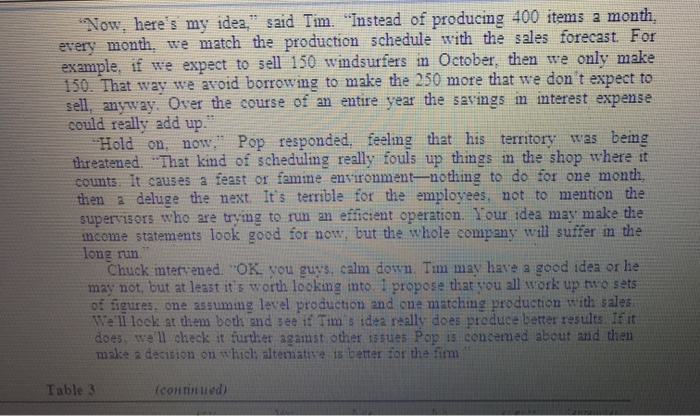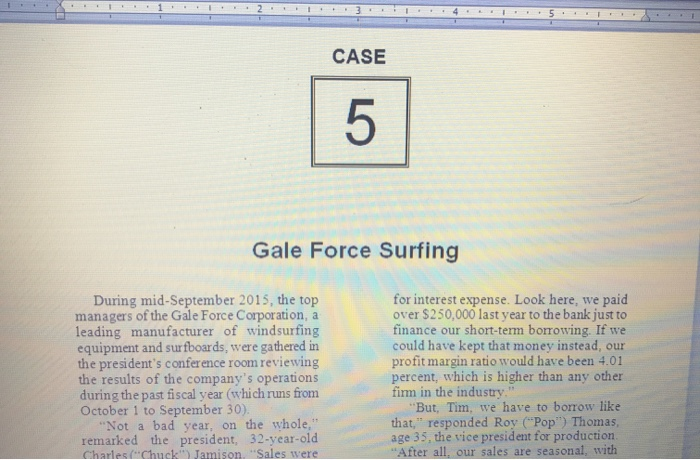
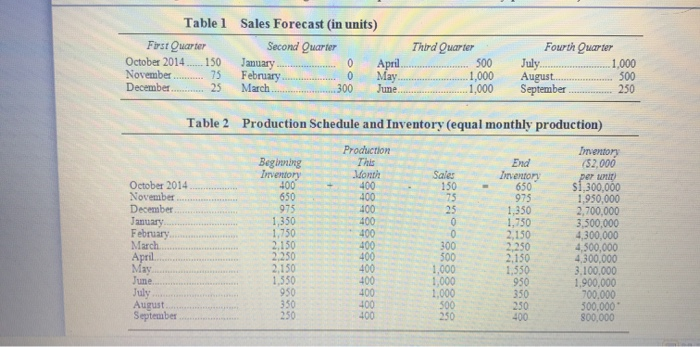
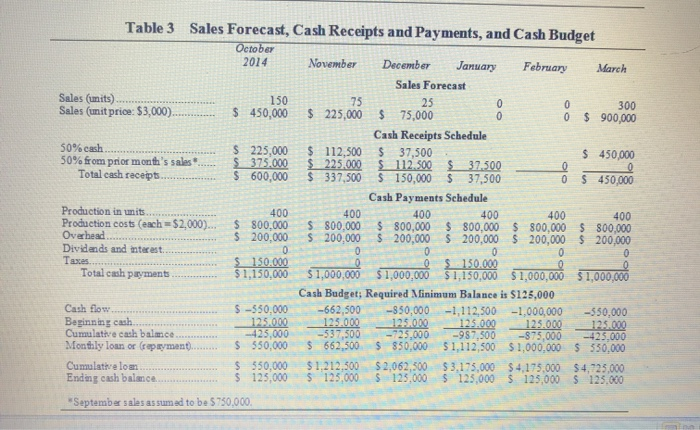
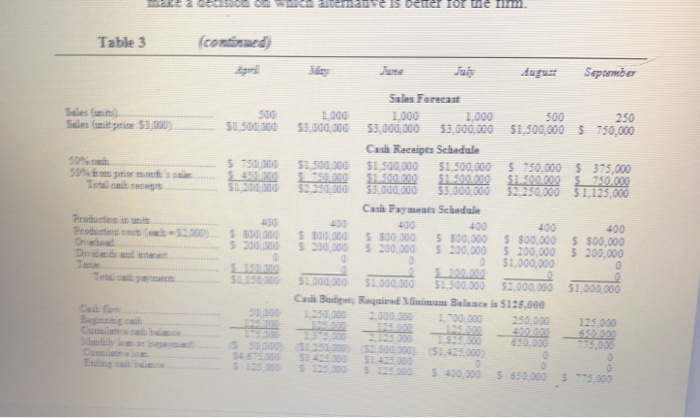
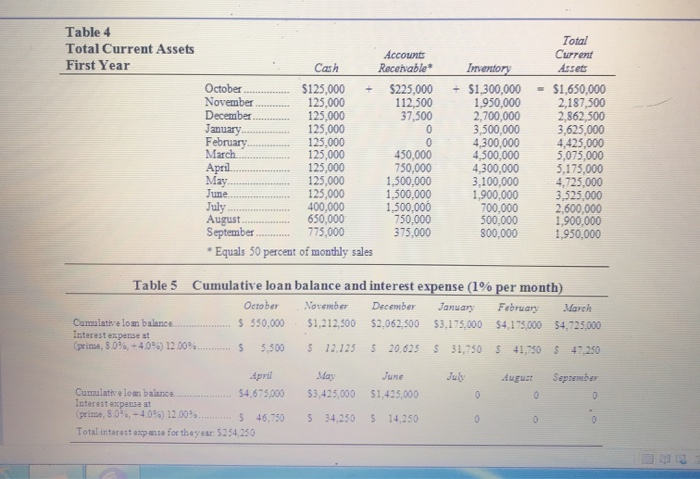
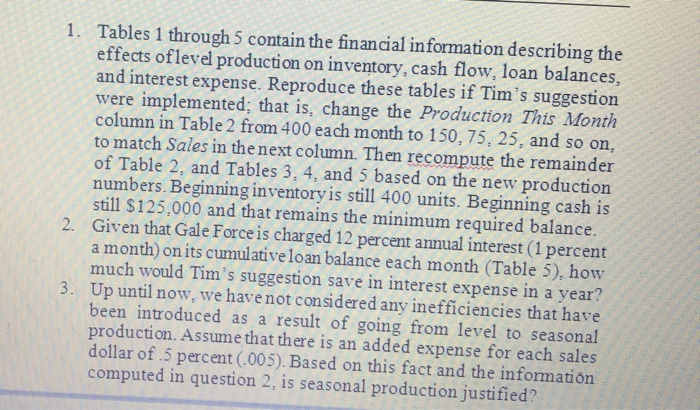
CASE 5 Gale Force Surfing for interest expense. Look here, we paid over $250,000 last year to the bank just to finance our short-term borrowing. If we could have kept that money instead, our profit margin ratio would have been 4.01 percent, which is higher than any other fim in the industry." "But, Tim, we have to borrow like that," responded Roy ("Pop) Thomas, 35, the vice president for production. During mid-September 2015, the top managers of the Gale Force Corporation, a leading manufacturer of windsurfing equipment and surfboards, were gathered in the president's conference room reviewing the results of the company's operations during the past fiscal year (which runs from October 1 to September 30). "Not a bad year, on the whole," LO Sales Forecast (in units) Table 1 First Quarter Second Quarter Fourth Quarter July August September Third Quarter October 2014 November December.. 150 January 75 February 25 0 April 0 May June 500 1,000 1,000 1,000 500 250 March 300 Production Schedule and Inventory (equal monthly production) Table 2 Production Inventory (52,000 Beginning Inventory 400 650 975 This Month 400 400 400 400 400 400 400 400 400 400 400 400 End Sales 150 75 25 Inventory 650 975 1,350 1,750 2,150 2,250 2,150 1,550 950 350 250 400 per unit si,300,000 1,950,000 2,700,000 3,500,000 4,300,000 4,500,000 4,300,000 3,100,000 1,900,000 700,000 500,000 800,000 October 2014 November December January February March April. May June July August. September 1,350 1,750 2.150 2250 2,150 1,550 950 350 250 0 300 500 1,000 1,000 1,000 500 250 Table 3 Sales Forecast, Cash Receipts and Payments, and Cash Budget October 2014 November December January February March Sales Forecast Sales (units). Sales (unit price: $3,000). 150 75 S 75,000 25 0 0 300 $ 450,000 $ 225,000 $ 900,000 0 Cash Receipts Sehedule 50% cash 50%from prior month's sales Total cash receipts S 225,000 S 375,000 S 600,000 $ 112,500 $ 225,000 $ 337,500 S 37,500 $ 112,500 S 150,000 S 450,000 0 37.500 $ 37,500 $ 450,000 0 Cash Payments Schedule Production in units Production costs (each $2,000).. Overhead. Dividands and interest 400 $ 800,000 S 200,000 400 $ 800,000 S 200,000 400 S 800,000 S 200,000 400 S 800,000 $ 800,000 800,000 400 400 S 200,000 0 S 150.000 $1,150,000 $1,000,000 S 200,000 200,000 0 0 0 Taxes... S 150.000 $1,150,000 $1,000,00 $1,000,000 $1,000,000 Total cash payments Cash Budget; Required Minimum Balance is $125,000 Cash flow S -550,000 125,000 -425,000 $ 550,000 -662,500 125.000 -537,500 $ 662,500 -1,112,500 -1,000,000 125.000 -987,500 $ $50,000 $1,112,500 $1,000,000 $ 550,000 -850,000 125.000 -725,000 -550,000 125.000 -425,000 Beginning cash. Cumulative cash balmce Monthly loan or (repaymant). 125.000 -875,000 $3,175,000 $ 4,175,000 $4,725,000 125,000 $ 125,000 125,000 Cumulathe loan S 550,000 $ 125,000 $1.212.500 $ 125,000 $2,062,500 S 125,000 Ending cash balance. September sales as sumed to be $750,000 Ich alteri2UNE Is Deter for ue Im (continued Table 3 September May June July Augut Sales Forecast Sales (an) Sales (unit price 53.000) 500 S1.500 000 1,000 53,000,000 1,000 $3.000,000 1,000 $3.000.000 500 $1,500,000 $ 750,000 250 Cash Recaipts Schedule $1.500,000 S1.300 000 $3,000,000 50% ca 50%f prie mmts sa Total ca ecg $ 750000 S1.500 000 S750 000 $2250.000 $ 750,000 S 375,000 $1.500.000 S 750.000 $2.250,000 S1,125,000 $1.500,000 51.500.000 $3.000,000 S0200 000 Cash Paymeats Schedule Production inms Productios cots 52) On Divded d atere Tee Teal ca p 430 S 30000 400 S S00.000 S 200 000 400 S S00,000 S 200.000 400 S B00,000 $ 200,000 400 S S00,000 $ 200,000 $1,000,000 400 S S00,000 $ 200,000 0 S 300.000 $1300,000 S1151 00 000 300 SL000 000 $2.000,000 $1,000,000 Ca Budg Raqaired Minimam Balaace is 5125.000 Cask o Beginng ca Cuilat ca Menthy r ie Cumte Endag at baa 5000 2.000 000 125.000 2E1 000 32000 000 S1425000 S25000 1250000 .000 135 000 00 S425 000 100.000 000 1.325 000 (51.425000 250.000 400 000 650,000 125,000 650.000 75.000 S00 $4 0 S 1 S 400 000 S 650,000 Ss000 Table 4 Total Total Current Assets Accounts Receivable Current First Year Cash Inventory Assets October November December January February $125,000 125,000 125,000 125,000 125,000 125,000 125,000 125,000 125,000 400,000 650,000 775,000 $1,650,000 2,187,500 2,862,500 3,625,000 4,425,000 5,075,000 5,175,000 4,725,000 3,525,000 2,600,000 1,900,000 1,950,000 $225,000 112,500 37,500 0 $1,300,000 1,950,000 2,700,000 3,500,000 4,300,000 4,500,000 4,300,000 3,100,000 1,900,000 700,000 500,000 S00,000 0 March. 450,000 750,000 1,500,000 1,500,000 1,500,000 750,000 375,000 April. May June July August September Equals 50 percent of monthly sales Table 5 Cumulative loan balance and interest expense (1% per month) October November December January February March Cumalathe loan balance Interest expense at (prime, 8.0%, -4.0%) 12.00% . S550,000 $1,212,500 $2,062,500 $3,175,000 $4,175,000 $4,725,000 S 12,125 S 31,750 S 41,750 47.250 5,500 S 20,625 April May June July September August Cumulath lon balance Interest expense at (prime, 8.0%,-4.0% ) 12.00 % $4,675,000 $3,425,000 $1,425,000 0 0 S 34,250 $ 46,750 14,250 0 0 Total intarest ep ase for theyear 5254,250 1. Tables 1 through 5 contain the financial information describing the effects oflevel production on inventory, cash flow, loan balances, and interest expense. Reproduce these tables if Tim's suggestion were implemented; that is, change the Production This Month column in Table 2 from 400 each month to 150, 75, 25, and so on, to match Sales in the next column. Then recompute the remainder of Table 2, and Tables 3, 4, and 5 based on the new production numbers. Beginning inventory is still 400 units. Beginning cash is still $125,000 and that remains the minimum required balance. 2. Given that Gale Force is charged 12 percent annual interest (1 percent amonth) on its cumulative loan balance each month (Table 5), how much would Tim's suggestion save in interest expense in a year? 3. Up until now, we havenot considered any inefficiencies that have been introduced as a result of going from level to seasonal production. AS sume that there is an added expense for each sales dollar of .5 percent (.005). Based on this fact and the information computed in question 2, is seasonal production justified? Now, here's my idea," said Tim. Instead of producing 400 items a month, every month, we match the production schedule with the sales forecast. For example, if we expect to sell 150 windsurfers im October, then we 150. That way we avoid borrowing to make the 250 more that we don t expect to sell, anyway. Over the course of an entire year the savings in interest expense could really add up. Hold on, now," Pop responded, feeling that his territory was threatened. "That kind of scheduling really fouls up things in the shop where it counts. It causes a feast or famine environment-nothing to do for one month, then a deluge the next. It's terrible for the employees, not to mention the supervisors who are trying to run an efficient operation. Your idea may make the mcome statements look good for now, but the whole company will suffer in the long run. Chuck mtervened. OK you guys, calm down. Tim may have a good idea or he may not, but at least it's worth looking into I propose that you all work up two sets of figures, one assuming level production and one matching production with sales We'll lock at them both and see if Tim's idea really does produce better results. If it does, we ll check it further agamst other issues Pop is concemed about and then make a decis1on on which altemative is better for the fim only make being Table 3 (continued)






